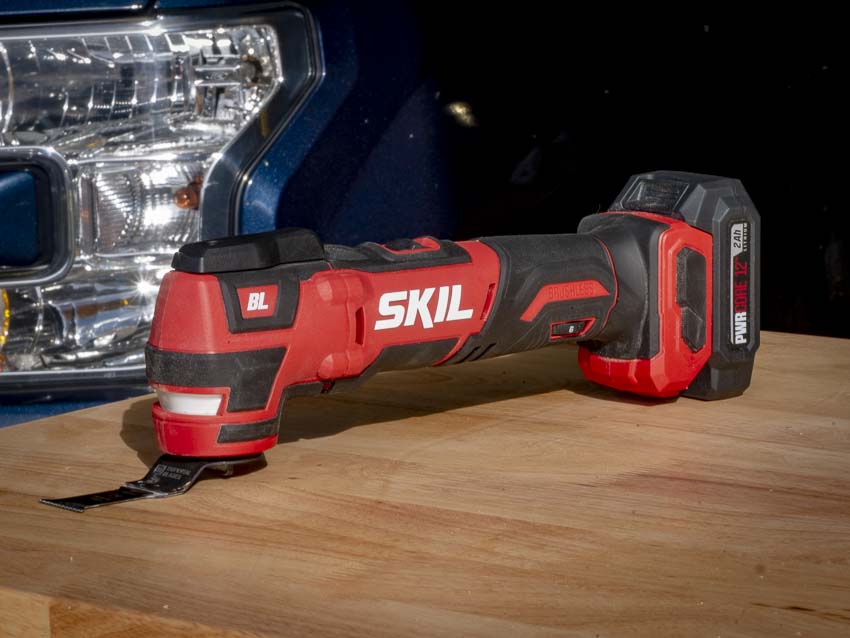The Skil 12V Brushless Oscillating Multi-Tool is a new player on the scene making us wonder what exactly you should expect from a DIY 12V brushless tool. To find out, we put it through the same exact tests we did in our oscillating tool shootout to see how it performs. The results were shocking!
Pros
- Fast cutting speeds
- Great ergonomics
- Pro-level feature set
- Good vibration and noise control
- Lightweight, compact, and slim design
Cons
- 12V battery limits runtime
Feature Set
Tool-Free Blade Change
The fact that the blade change is tool-free isn’t groundbreaking, but every brand seems to do it a little different. Skil goes with a twist lever to release and lock their 2-pin IOS system.
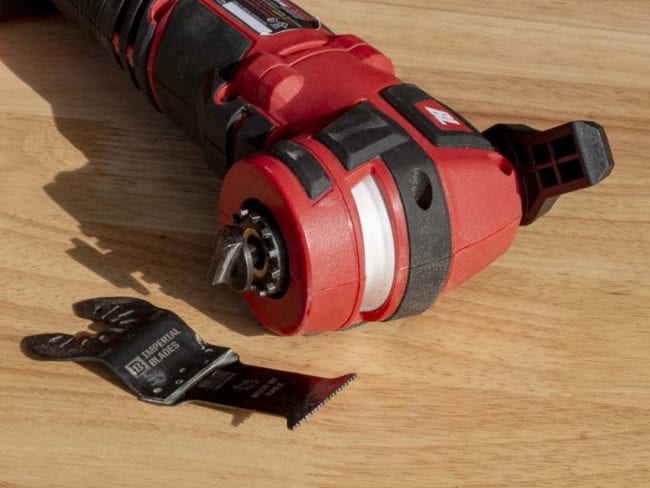
A magnetic ring in the center holds the blade while you clamp it back down. The magnet isn’t as strong as what we see from Ridgid, but it does keep it from slipping away.
LED Light
Skil also breaks from tradition by using a brighter LED light system. Centered right above the blade, a light on either side works with a diffuser to cast the light slightly downward where your blade is getting ready to work. It’s an effective system.
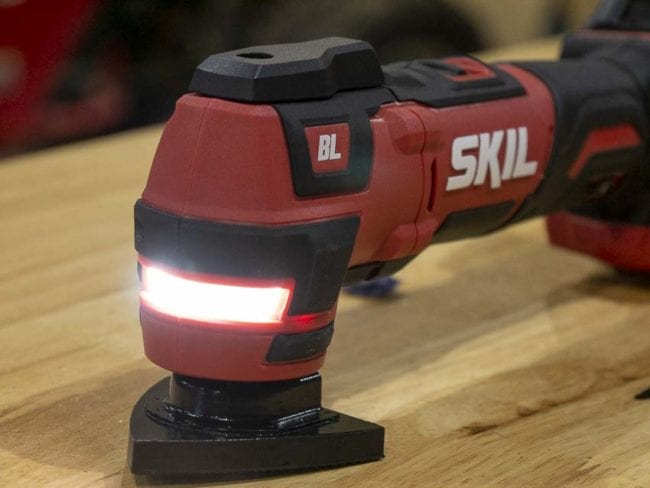
Additional Features
- Brushless Motor
- Variable Speed Dial
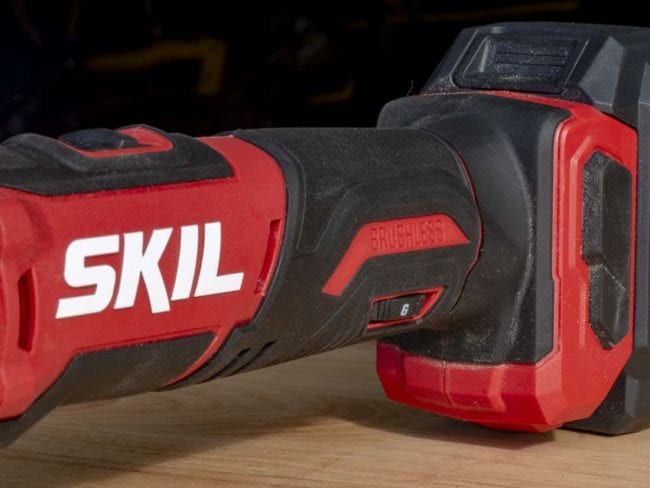
Ergonomics
The Skil 12V Brushless Oscillating Multi-Tool scores very high in ergonomics thanks to a couple of areas.
As a 12V tool, it has a smaller profile and weight than its corded and 18V brethren. Bare, it weighs 2.25 pounds and just 2.88 pounds with its 2.0 Ah battery. That’s among the lightest we’ve ever tested, though there are a couple of models running around that are lighter. Most multi-tools are over the 3-pound mark and average cordless is even higher.
Skil also benefits from a slim design that it much easier to grip if you have smaller hands. The traditional grinder style is still present, just with less diameter in the handle.
Purely a point of preference, I’m also a fan of Skil’s on/off switch instead of a paddle switch. Simple plunge cuts are one thing, but when I’m working in awkward spaces, I like the freedom of moving my hands around without worrying about the trigger.
Performance
Cutting Speed
The Skil 12V Brushless Oscillating Multi-Tool has an oscillation rate of 11,000 – 18,000 OPM and a 3.6º angle. The OPM rate is right in line with most of the multi-tools we use and the 3.6º angle is a little better than the standard 3.2º, but Skil isn’t alone in using it.
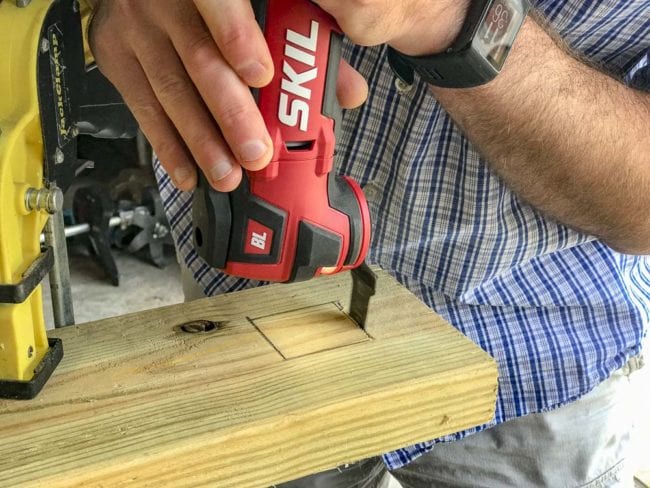
Alright, I promised you a shocking result and here’s where it really starts to come into play. Our testing rig ensures that every multi-tool has the same amount of pressure when making a cut in 2x untreated pine.
I made a few test cuts and the tool seemed fast. Putting a stopwatch to work, its slowest cut was 7.35 seconds and its fastest was 7.00. After averaging all of our test cuts, it came in with 7.2-second average.
The only one of the other 26 tools we tested in the same exact manner to cut faster is Festool’s Vecturo. The closest any cordless competitors got was DeWalt’s 20V Max at 19.2 seconds. That means it beat out Milwaukee, Makita, DeWalt, and yes, all four of our Fein models in cutting speed.
And it’s a 12V tool.
The downside is that you won’t get as much runtime from the 12V battery packs as you will from 18V models.
Vibration Control
Skil does a pretty good job of keeping the vibration under control. You can feel it when you’re running it under no load, but it transfers the majority of that into the material you’re cutting. Skil does a Pro-level job here, though Fein still owns the vibration control category by a wide margin.
Noise Level
Out in a field to kill any indoor reverb, Skil averages 95 dB(a) in high speed while making a cut. That’s on the low end of our models that range from 92 decibels to 104.
Price and Value
Skil is clear that they’re targetting DIYers with this line of tools. As a bare tool, the Skil 12V Brushless Oscillating Multi-Tool runs $59.99. There’s no single-tool kit available, so you’ll have to pony up another $29.99 for a 2.0 Ah battery or $39.99 for a 4.0 Ah battery. Throw in another $29.99 for a standard charger and your least expensive cost is $119.97.
Even though that’s a great price for a cordless, brushless oscillating tool, you can get even more value by looking at Skil’s other kit options. Several include their multi-tool and you can get it with their brushless drill for $129.99 – just $10 more than outfitting the tool on its own.
The Bottom Line
The Skil 12V Brushless Multi-Tool enters the DIY market with the performance we expect from Pro-level tools. The price is more in line with the Prosumer market, though you’re not likely to find many pure cordless, brushless models running around outside the Pro market. The one thing that Skil won’t be able to compete with the 18V/20V Max tools on is runtime since its battery capacity is significantly lower.
Skil 12V Brushless Oscillating Multi-Tool Key Features
- Longer run time and battery life with PWRCore 12 Lithium Battery
- Compact power with a brushless motor
- Quick-release lever for fast and convenient accessory changes
- 3.6-degree oscillating tool angle allows faster cutting speeds
- 2 pin IOS interface
Skil 12V Brushless Oscillating Multi-Tool Specifications
- Model: Skil OS592701
- Oscillation angle: 3.6°
- No load speed: 11000-18000 RPM
- Speed: 6-speed auto sensing
- accessories: 12 pcs for tool only
- Warranty: 5 years limited
- Price: $99.99 (kit with battery, charger, and brushless drill)

